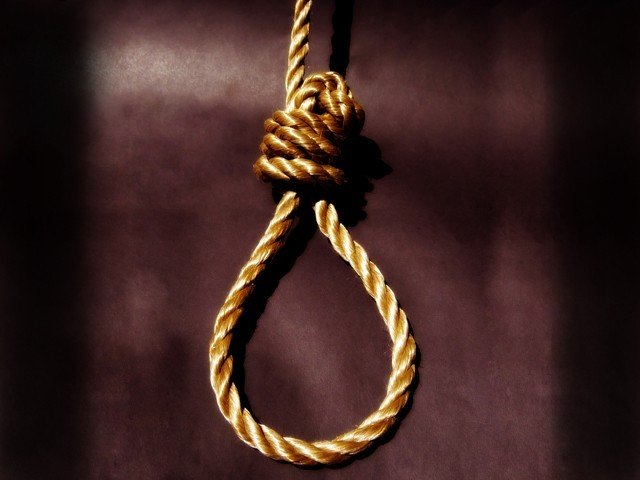
The bench, while staying the execution of Muhammad Faiz till January 5, summoned the superintendent of Faisalabad jail, who had obtained death warrants for the convict.
It also sought explanation from the anti terrorism court as to how the black warrants were issued when Faiz’s appeal was pending before the Supreme Court.
Faiz had been condemned to death by an anti-terrorism court in 2006, for killing an army official Lance Naik Tariq Mahmood, in Nankana Sahib.
After his death sentence was confirmed by the LHC, Faiz had filed an appeal before Supreme Court, which had granted leave to appeal.
A special anti-terrorism court on December 25, 2014 issued black warrants for Faiz on an application filed by Faisalabad jail superintendent and had fixed January 14 for his execution.
Challenging his execution order, Faiz had pleaded that his appeal was pending before the supreme court and till the apex court rules on his appeal, his black warrants can not be issued.
COMMENTS (7)
Comments are moderated and generally will be posted if they are on-topic and not abusive.
For more information, please see our Comments FAQ

1730360426-0/Menendez-Brothers-(2)1730360426-0-165x106.webp)
1732534556-0/taylor-(14)1732534556-0-165x106.webp)
1725872216-0/Tribune-Pic-(3)1725872216-0-165x106.webp)
1732532771-0/BeFunky-collage-(89)1732532771-0-165x106.webp)












The state is supposed to provide security, health, education and shelter and not take upon the responsibility to make sure citizens are chaste and make smooth entry into heavens above. Not a function of the state. The monumental blunder and was when religion was brought under public domain in 1974 and from thereon Pakistan became victim of state initiated extremism. There has to be separation of state and religion in the matters of governance or that of individual as a citizen.
In 1953 the Daultana administration played into the hands of a few clerics in the hope of saving the government in the Punjab and the nation for the first time witnessed sectarian violence. Back then the Army was functioning under unity of ideology, command and action with the state executive. The cacophony by the section of clerics was firmly addressed and successfully crushed and sectarian peace was restored. Timely and precise action was carried out even at the cost of a potential backlash by the masses when those at the top of orchestrating sectarian violence were apprehended.
Then Bhutto in 1974 saw his survival in appeasing the religious leaders. In 1974 religion was brought in the public domain. The constitution of Pakistan in 1974, in an unprecedented example in the history of modern legislation took on the responsibility of identifying faith of its people. Ahmadis were constitutionally declared to be out of the fold of Islam. By caving in to clerics’ demands, Bhutto and Daultana gained no political mileage, both met with miserable ends. But what it did do was that it generated sectarian tendencies among the masses and caused widespread problem of bigotry and extremism.
If anybody at all is interested in the moral and intellectual recovery of Pakistani society some very bold steps will have to be taken and be prepared for a severe backlash.
@Wizarat: The idea of having an independent judiciary is precisely to avoid being pressured by the public .
It's likely a simple question of jurisdiction, guessing from what was said. When an appeal is taken, the lower court's authority to take further action usually is stayed until the appeal is decided and the case is remanded to it. If this was the situation here, the Supreme Court is properly asking the lower court where it obtained its authority to issue a death warrant. If the lower court had none, the death warrant is invalid. Caveat: I don't know Pakistani appellate law, but practiced criminal appellate law in California for 23 years.
@Wizarat: Stop this mob mentality. Let the courts do their job. Whatever the situation, state must provide fundamental human rights to each and every citizen. This is the only difference between us and terrorists.
Is this justice in action.........or is this misuse of a lethargic, inept judicial system ?
The courts must understand that the public now is watching and if the punishment is not given according to the sharia, they would be committing blasphemy according to the law of the land. Their actions would insult Islamic rules of Qisas.in the case of Murder. essentially a blasphemous act by the courts.
Do watch for SYMPATHIZERS.